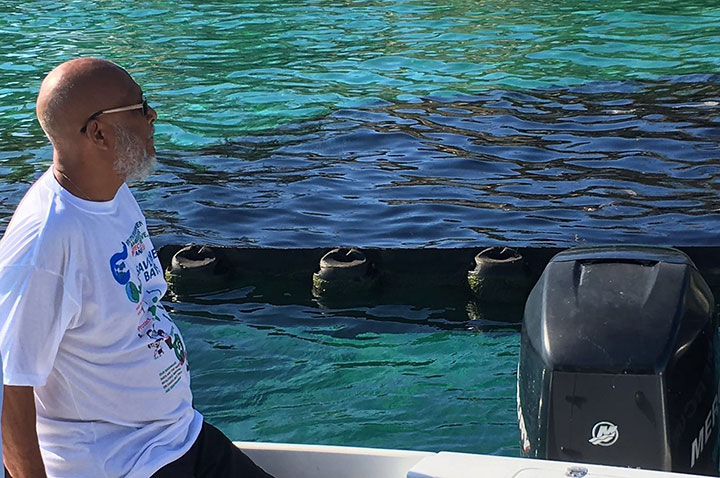|

|
 |
|
Last Updated: Feb 13, 2017 - 1:45:37 AM |

Waterkeepers Bahamas President and Save the Bays Chairman Joseph Darville (above) recently participated in a boat tour of the oil-polluted Clifton Bay along with international experts, including Waterkeeper Alliance Executive Director Marc Yaggi who told his colleagues the only way to prevent environmental catastrophes from continuing to escalate in The Bahamas is by taking steps to ensure transparency and accountability through enactment of Freedom of Information legislation and a comprehensive Environmental Protection Act.
|
Nassau, Bahamas - International experts, including a former presidential advisor, toured Clifton and the Southwest Bays recently, their boat slicing through the water between oil slicks and coasting over reefs as they witnessed the sharp distinction between some of the world’s most beautiful waters and the oil pollution threatening its health and the fish, conch and crawfish that call it home.
“What we saw breaks your heart,” said Joseph Darville, Chairman of Save The Bays and President of Waterkeepers Bahamas, an organization licensed to monitor Bahamian waters. “This is an area where many Bahamians who lived in Nassau used to come to fish. There were live coral reefs with thousands and thousands of mutton snappers, grey snappers and other species. This is no longer the case. Due to the so-called development in this area, it has been saturated with oil and the reefs in the vicinity have died.”
The two-hour boat excursion, videoed and recorded by a local company, also included fellow Save The Bays members Rashema Ingraham, Diane Phillips and Paco Nuñez as well as representatives from Clifton Waterkeeper, Bimini Waterkeeper, and Grand Bahama Waterkeeper. The outing was part of a day-long trip arranged in cooperation with Marc Yaggi, Executive Director for Waterkeeper Alliance, one of the world’s fastest-growing environmental movements comprised of 293 Waterkeeper organizations in 34 countries on six continents, who together patrol and protect nearly 2.5 million square miles of watershed.
“I snorkeled at the same reef I had snorkeled about eight years ago,” said Yaggi, who travels the world inspecting changes in the marine environment as part of Waterkeepers’ long-range goal of cleaning up the world’s waters, creating more areas where water is drinkable, fishable and swimmable.
“It was very obvious that the reef had undergone significant stress. There were fewer fish and the coral had clearly seen better days,” he said. “The Waterkeeper team showed me more of the dark underbelly of this tropical paradise.We saw massive oil plumes fouling some of the clearest waters on earth.The stench of oil was dizzying.”
Save The Bays, a burgeoning environmental advocacy group that was initially established for the purpose of preserving and protecting Clifton Bay and other common marine environments surrounding New Providence, has garnered upwards of 7,000 signatures on a petition calling upon the government to take positive action to protect against devastating threats to the country’s marine environment, namely oil pollution in Clifton Bay as well as the toxic runoff resulting from unregulated development.
“It’s very important that we protect our natural resources and find a balance between development and environmental protection for the benefit of future generations of Bahamians,” said Nuñez, press liaison for Save The Bays. “If we are not careful about how we develop them, we stand the chance of severely compromising the natural advantages of our country.”
As one of its main tenets, Save The Bays has repeatedly spoken out against unregulated development like Simm’s Point/Nygard Cay, a development which international conservationists, including Waterkeeper Alliance members, have called a tragedy due to the fact that construction of groynes and jetties associated with the project have blocked the flow of sand into Clifton Bay ultimately leading to the erosion of Jaws Beach.
Nuñez pointed to a lack of transparency and accountability in Bahamian government as the greatest obstacles to achieving justice for the environment in The Bahamas, a point which Yaggi himself discussed with the Waterkeeper community during his recent visit.
“Information is power and that forces a level of transparency which will allow members of the community to follow along as important decisions are being made,” Yaggi said. “The lack of a Freedom of Information law is typically the result of having people in leadership who don’t want the public to know what’s going on. They want to keep their actions hidden, and there’s a reason behind that, so shining a light on that is incredibly important.”

© Copyright 2016 by thebahamasweekly.com
Top of Page
|
|
 |

|
